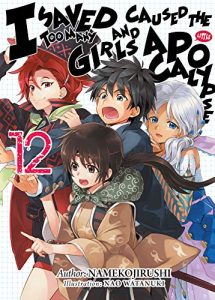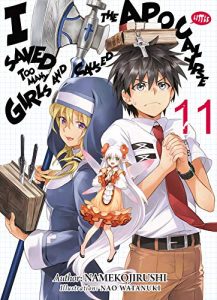By Namekojirushi and Nao Watanuki. Released in Japan as “Ore ga Heroine o Tasukesugite Sekai ga Little Mokushiroku!?” by Hobby Japan. Released in North America digitally by J-Novel Club. Translated by Mana Z.
We’re starting to run out of series, and so it’s no surprise that we get a school festival here. In fact, it’s two school festivals, as Rekka’s school is combining forces with Hibiki’s school. In fact, this volume really seems to revel in having its cliches and lampshading them too: our heroes get trapped in a game, Rekka has to run around trying to find the key to stopping a bomb from going off; Rekka and Hibiki bump heads and (in the classic tradition) end up inside each other’s bodies, and finally Rekka has to deal with the architect of (almost) all of these, a fortune telling girl who is trying to take Makoto Naegi’s role of Ultimate Lucky Student… though the luck isn’t always welcome. Add to that trying to find room to cram in every single heroine, and you have a book that’s pretty packed despite (as always) a small page count.
Given how huge the cast is already, I am grateful that we once again only have two new heroines. Yorun is a standard RPG girl that the others meet when they’re trapped in a game world, and at first seems to be the same as the other NPCs, but there’s more to it than that, especially since they’re investigating this as a “cursed game” to begin with. The interesting thing about her story is also, to be fair, probably the book’s weak point: it’s not really resolved all that well. Yorun is “rescued” by Rekka, but has already lost damn near everything, and by the end of the novel still has no real clue how to go about getting it back. It feels dissatisfying… but at the same time it’s nice to see that Rekka and his team can’t do EVERYTHING.
The meat of the story lies with the second heroine, Touko, a fortune teller who challenges Rekka to various contests as she’s foreseen that he might actually be able to defeat her – something that no one has ever done as she has reality-warping powers that always make things work for her. The trouble with that is that she feels worse every time she uses them, as she knows that she can’t go nuts – she could literally end hunger, but what would that do to the world? Rekka’s solution to her story is not all that dramatic, but it doesn’t have to be: in the end Touko is sort of the Haruhi Suzumiya of this series, and her “being saved” involves showing her that the world is not, ultimately, as predictable or as small as she thought. It’s a rather sweet, low-key ending to this volume.
We’re three away from the end now, so I suspect that we’re going to get (slightly) more serious going forward. Little Apocalypse will never excite anyone, but it does its premise well, now that it’s mostly abandoned subverting the harem genre.



